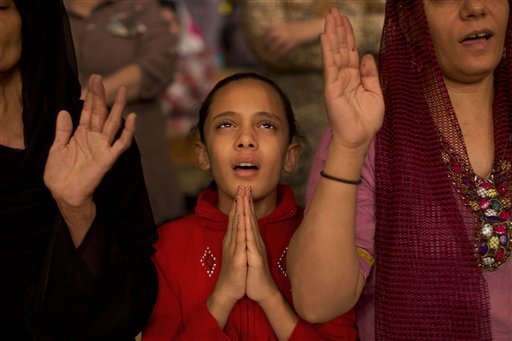There was no mention of churches torched or Christians killed, but the prayer neatly written on a tiny piece of paper and placed atop an icon of St. George in the chapel of a desert monastery left no doubt about the growing fear and despair of Egypt’s Coptic Christians.
“Oh Lord, for the sake of all the saints of the church, raise high the banner of the cross and vanquish our enemies, the enemies of the church,” it read. “Make our enemies realize their weakness, foil their actions against us, bring joy to our hearts, increase our profit and make us victorious.”
There were folded slips of paper all over the icon of the Christian knight rearing on his steed and skewering a dragon with his spear. Tucked into its frame, piled on a small table below it, spilling on the floor around it, all pleas to God for health, fertility, wealth, happiness — and protection. Copts stood motionless in prayer before the image. Others broke into hymns praising his valor. Wanting to linger in the saint’s presence, families picnicked on the chapel floor, gossiping and eating sandwiches.
The past week, hundreds of thousands of Copts from across the country flocked to the monastery of Mar Girgis, as St. George is known in Arabic, in one of the biggest and most exuberant events of the year for Egypt’s Christians. The annual pilgrimage at the walled monastery in the deserts of southern Egypt overlooking the Nile is a festival of faith, a time to pay homage to the 3rd Century saint who is one of the most revered figures of Christianity’s oldest Church.
It is also an opportunity for Christians to exult in their identity in an atmosphere away from the daily discrimination — large and small, subtle and blatant — that they say they increasingly face in this nation where the Muslim majority has been growing more conservative for decades.
At this year’s pilgrimage, Christians’ sense of siege is stronger than ever, after Muslim hardliners gained political dominance, vowing to rule Egypt by Islamic law. Many Christians are convinced they are enduring the worst sectarian persecution any of them can remember. Some even speak of an imminent second “age of martyrdom,” recalling the era of persecution of Christians under Roman rule that remains burned into Copts’ historic memory nearly 2,000 years later.
“Without a divine intervention that is both visible and strong, I think we are moving toward a confrontation that will have grave ramifications for Egypt,” said Bishop Bieman, a charismatic church leader in the southern province of Qena. “I am not worried about us Christians on the long term, but I am seriously concerned about what happens to us on the short term. Efforts to impose a religious state are accelerating.”












